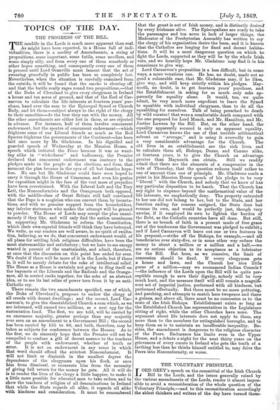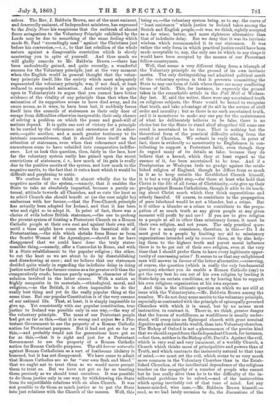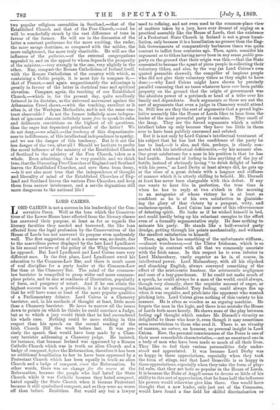THE VOLUNTARY PRINCIPLE.
T ORD GREY's speech on the committal of the Irish Church .1..J Bill in the Lords, and the issues generally raised by the various amendments of the Lords, render it almost impos- sible to avoid a reconsideration of the whole question of the Voluntary Principle,—and to this reconsideration accordingly the ablest thinkers and writers of the day have turned them-
selves. The Rev. J. Baldwin Brown, one of the most eminent, and deservedly eminent, of Independent ministers, has expressed
to the Daily News his suspicions that the outbreak of almost
fierce antagonism to the Voluntary Principle exhibited by the Lords may be due to something of the same feeling which made St. Paul "exceedingly mad" against the Christians just
before his conversion,—i. e., to that last rebellion of the whole nature against a disagreeable conviction which is slowly
mastering you in spite of yourself. And thus much we will gladly concede to Mr. Baldwin Brown :—there has 'been undoubtedly gained, and quite recently, a wonderful success for the Voluntary principle, just at the very moment when the English world in general thought that the volun- tary principle itself, like the society which most adequately represented the voluntary principle, was, if not dead, at least reduced to suspended animation. And certainly it is quite open to Voluntaryists to argue that you cannot have better 'evidence of the vitality of any principle than that when the
animation of its supporters seems to have died away, and its cause seems, as it were, to have been lost, it suddenly forces itself into the councils of statesmen as their only door of escape from difficulties otherwise insuperable, their only chance of solving a problem on which the peace and good-will of nations depend. It is quite one sort of victory for a principle to be carried by the vehemence and earnestness of its adher- ents,—quite another, and a much greater testimony to its intrinsic reasonableness, that it should force itself on the attention of statesmen, even when that vehemence and that 'earnestness seem to have subsided into comparative indiffer- ence. Let us look this question, then, fairly in the face, how far the voluntary system really has gained upon the secret convictions of statesmen, 1. e., how much of its gain is really due to the positive merits of the system, and how much to the negative merits, to the fact that it cuts a knot which it would be 'difficult and perplexing to untie.
We confess that we think it almost wholly due to the negative merits of the system,—namely, that it enables the state to take an absolutely impartial, because a purely ex- ternal, attitude towards all Churches, and so cuts the knot as to which Church she should benefit or (as the case might be) embarrass with her favour,—that the Free-Church principle has actually been adopted for Ireland, and that it has been wise and right so to adopt it. In point of fact, there was a 'choice of evils before British statesmen,—the one to prolong the present system of foisting a Protestant Church on a Roman Catholic people at their own cost and against their own will, until a time might have come when the fanatical side of Protestantism,—the side which shrinks from Rome as from the Scarlet Woman of the Apocalypse,—should so far have 'disappeared that we could have done the truly states- manlike thing,—namely, offer a Concordat to Rome, and with it a State establishment to the popular religion ; the other, to cut the knot as we are about to do by disestablishing and disendowing at once ; and we believe that our statesmen decided quite wisely in regarding the indefinite delay in doing justice needful for the former course as a far greater evil than the comparatively crude, because purely negative, character of the solution involved in the latter course. With a nation so ilighly composite in its materials,—ethnological, moral, and religious,—as the British, it is often impossible to do the really best thing and yet do the really popular thing at the same time. But our popular Constitution is of the very essence of our national life. That, at least, it is simply impossible to give up. Yet consistently with our popular constitution, true justice to Ireland was possible only in one way,—the way of the voluntary principle. The mass of our Protestant people bad got so far as this,—that it is wrong and unjust for a Pro- testant Government to use the property of a Roman Catholic nation for Protestant purposes. But it had not got so far as this,—and probably would not for generations have got so far as this,—that it is right and just for a Protestant Government to use the property of a Roman Catholic nation for Roman Catholic purposes. The old horror naturalis against Roman Catholicism as a sort of loathsome idolatry is lessened, but it has not disappeared. We have come to admit that Roman Catholics are so far "our own flesh and blood" that we ought not to treat them as we would never permit them to treat us. Bat we have not got so far as treating them precisely as we should treat ourselves. It was possible to do them justice only in one way, by withdrawing the State from its unjustifiable relations with an alien Church. It was not possible to do them so much justice as to put the State into just relations with the Church of the masses. Well, this
being so,—the voluntary system being, so to say, the curve of "least resistance" which justice to Ireland takes among the Scotch and English people,—it was, we think, rightly accepted as a far wiser, better, and more righteous alternative than that of indefinite delay. But we deny that it was its intrinsic wisdom which recommended it to our statesmen. It was rather the only form in which practical justice could have been made acceptable to, nay, the only one in which in any shape it would have been accepted by the masses of our Protestant fellow-countrymen.
Well, that seems a very different thing from a triumph of the Voluntary principle on the ground of its own intrinsic merits. The only distinguishing and admitted political merit of the voluntary system is that it prevents committing the
State to any one form of faith where there are many conflicting forms of faith. This, for instance, is expressly the ground taken in the remarkable article in the Pall Mall of Wednes-
day last. If, said the writer, there were any ascertained truth on religious subjects, the State would be bound to recognize that truth, and take advantage of its aid in the service of civil order and morality ; but as there is no such ascertained truth, and it is monstrous to make any one pay for the maintenance of what he deliberately believes to be false, there is no choice but for the State to stand aloof altogether till some one creed is ascertained to be true. That is nothing but the theoretical form of the practical difficulty arising from the
confliot of Churches. We submit in reply that, in point of fact, there is evidently no monstrosity to Englishmen in con- tributing to support a Protestant faith, even though they
do regard many of its details as false, because they do
believe that a kernel, which they at least regard as the essence of it, has been ascertained to be true. And if a
Presbyterian or Wesleyan feels no grudge against the estab- lished religion of England, though he differs from so much in it as to keep outside the Established Church himself, it is but a very slight step,—for those at least who hold that Christ is the life of all forms of Christianity,—to give up their grudge against Roman Catholicism, though it adds to its teach- ing about Christ much which they think superstitious and utterly fanciful. Of course, to contribute to the propagation of pure falsehood would be not a blunder, but a crime. But is it either a blunder or a crime to contribute to the propa- gation of as much truth as any given people at any given moment will profit by and use ? If you are to give religion to a people at all in other than missionary forms, it must be their own religion, and not yours. The only practical ques- tion for a manly conscience, therefore, is this---' Do I do most good to a people by limiting my aid to missionary
organizations intended only to convert them, or by also help- ing them to the highest truth and purest moral influence there is to be got out of their own religion, even at the very
time that I should prefer them to have every legitimate oppor- tunity of canvassing mine ?' It seems to us that any enlightened man will answer in favour of the latter alternative,—reserving,
of course, the question (which is really the only fundamental question) whether you do enable a Roman Catholic (say) to
get the very best he can out of his own religion by lending it State-help on certain conditions, or by leaving him to support his own religious organization at his own expense.
And this is the ultimate question on which we are still at issue with the Voluntaryists,—Mr. Baldwin Brown among the number. We do not deny some merits to the voluntary principle, especially as contrasted with the principle of episcopally governed Churches with which it is usual, but by no means most instructive, to contrast it. There is, we think, greater danger that the leaven of worldliness, as worldliness is usually under- stood, will creep into an Episcopal church with great nominal dignities gnd considerable wealth, than into Voluntary churches. The Bishop of Oxford is not a phenomenon of the precise kind that we should expectfrorn the Independent Church, for instance, —but then, neither is the Bishop of St. David's. Against the evil, which is very real and very imminent, of a worldly Church, a Church which thinks more of principalities and powers than of Truth, and which contracts the insincerity natural to that tone of mind,—we must set the evil, which seems to us very much more common in the Voluntary Churches than in the Estab- lished Churches, of the intellectual dependence of the religious teacher on the sympathy of a number of people who cannot but be less really alive than he is to the difficulty of the in- tellectual problems to be solved,—and of the insincerities which spring inevitably out of that tone of mind. Let any honest-minded, wise man,—Mr. Baldwin Brown himself,— read, as we had lately occasion to do, the discussions of the two popular religious assemblies in Scotland,—that of the Established Church and that of the Free Church,—and he will be wonderfully struck by the vast difference of tone in favour of the former. He will see in the discussion of the latter a constant preference for the more exciting, the ruder, the more savage doctrines, as compared with the milder, the more enlightened, the more truly charitable. He will see the influence of the galleries,—of the external congregations appealed to, and on the appeal to whom depends the prosperity of the minister,—very strongly in the one, very slightly in the other. Nay, compare the Roman Catholicism of Ireland itself, with the Roman Catholicism of the country with which, as containing a Celtic people, it is most fair to compare it,— that of France,—and again unquestionably the advantage is greatly in favour of the latter in doctrinal tone and spiritual elevation. Compare, again, the teaching of our Established Church,—which is, for the present day, quite needlessly fettered in its doctrine, as the universal movement against the Athanasian Creed shows,—with the teaching, excellent as it often is, of the Wesleyan Methodists, and is not the same con- trast observable ? Is not the former infinitely more indepen- dent of ignorant clamour, infinitely more free to speak its calm and deliberate convictions on the highest of all questions, than the eager but dependent priesthood of the latter? We do not deny,—we admit,—the tendency of this dispassionate- ness to indifference, of this intellectual independence to apathy, and we see the danger of this tendency. But is it not the less danger of the two, after all ? Should we hesitate to prefer the moral influence of the ministry of the Established Church of Scotland to the ministry of the Free Church, taken as a whole. Even admitting, what is very possible, and we think true, that the Dissenting Free Churches of England and Scotland leaven the Established Churches, and save them from decay, —is it not also most true that the independence of thought and liberality of mind of the Established Churches of Eng- land and Scotland leaven the various Free Churches, and keep them from narrow intolerance, and a servile dogmatism still more dangerous to the national life ?
































 Previous page
Previous page